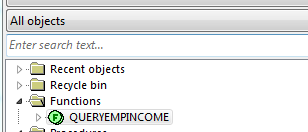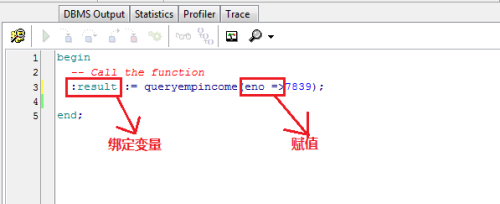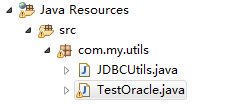首页 > 代码库 > PL/SQL和Oracle对象
PL/SQL和Oracle对象


PL/SQL
-一、变量
01)引用变量
-- 查询并打印7839的姓名和薪水 declare --定义变量保存姓名和薪水 --pename varchar2(20); --psal number; pename emp.ename%type; psal emp.sal%type; begin -- 得到1234的姓名和薪水 select ename,sal into pename,psal from emp where empno=1234; --打印 dbms_output.put_line(pename||‘的薪水是‘||psal); end; /
02)记录型变量
-- 查询并打印7839的姓名和薪水 declare -- 定义记录型变量:代表一行 emp_rec emp%rowtype; begin select * into emp_rec from emp where empno=7839; dbms_output.put_line(emp_rec.ename||‘的薪水是‘||emp_rec.sal); end; /
03)常量
Var1 constant varchar(13);
-二、语句
01)If语句
-- 判断用户从键盘输入的数字 --接受键盘输入 --num: 地址值,在该地址上保存了输入的值 accept num prompt ‘请输入一个数字:‘; declare -- 定义变量保存数字 pnum number := # begin if pnum = 0 then dbms_output.put_line(‘您输入的是0‘); elsif pnum = 1 then dbms_output.put_line(‘您输入的是1‘); elsif pnum = 2 then dbms_output.put_line(‘您输入的是2‘); else dbms_output.put_line(‘其他数字‘); end if; end; /
02)循环语句
-- 打印1~10 declare pnum number := 1; begin loop --循环 --退出条件 exit when pnum > 10; dbms_output.put_line(pnum); --加一 pnum := pnum + 1; end loop; end; /
-三光标(游标)
(作用类似Java中的数组)
光标的属性:
%isopen
%rowcount(影响的行数)
%found
%notfound
基本操作:
初始化:cursor c1 is select ename from emp;
打开:open c1;
取一行游标的值:fetch c1 into pjob;
关闭:close c1;
结束光标:exist when c1%notfound
-- 查询并打印员工的姓名和薪水 /* 光标的属性: %isopen %rowcount(影响的行数) %found %notfound */ declare -- 定义光标 cursor cemp is select ename,sal from emp; pename emp.ename%type; psal emp.sal%type; begin -- 打开光标 open cemp; loop --取当前记录 fetch cemp into pename,psal; --exit when 没有取到记录; exit when cemp%notfound; dbms_output.put_line(pename||‘的薪水是‘||psal); end loop; --关闭光标 close cemp; end; /
-- 涨工资,总裁1000 经理800 其他400 declare -- 定义光标 cursor cemp is select empno,job from emp; pempno emp.empno%type; pjob emp.job%type; begin rollback; --打开光标 open cemp; loop --取一个员工 fetch cemp into pempno,pjob; exit when cemp%notfound; --判断职位 if pjob = ‘PRESIDENT‘ then update emp set sal=sal+1000 where empno=pempno; elsif pjob = ‘MANAGER‘ then update emp set sal=sal+800 where empno=pempno; else update emp set sal=sal+400 where empno=pempno; end if; end loop; --关闭光标 close cemp; --提交 ---> ACID commit; dbms_output.put_line(‘完成‘); end; /
带参数的光标
-- 查询某个部门的员工姓名 declare cursor cemp(dno number) is select ename from emp where deptno=dno; pename emp.ename%type; begin open cemp(20); loop fetch cemp into pename; exit when cemp%notfound; dbms_output.put_line(pename); end loop; close cemp; end; /
-四、例外
01.实例一
/* SQL语句 select to_char(hiredate,‘yyyy‘) from emp; --->光标 --> 循环 --> 退出条件:notfound 变量:1. 初始值 2.最终得到 count80 number := 0; count81 number := 0; count82 number := 0; count87 number := 0; */ declare --入职年份 cursor cemp is select to_char(hiredate,‘yyyy‘) from emp; phiredate varchar2(4); --每年入职的人数 count80 number := 0; count81 number := 0; count82 number := 0; count87 number := 0; begin -- 打开光标 open cemp; loop --取一个员工的入职年份 fetch cemp into phiredate; exit when cemp%notfound; --判断年份 if phiredate = ‘1980‘ then count80:=count80+1; elsif phiredate = ‘1981‘ then count81:=count81+1; elsif phiredate = ‘1982‘ then count82:=count82+1; else count87:=count87+1; end if; end loop; --关闭 close cemp; --输出 dbms_output.put_line(‘Total:‘||(count80+count81+count82+count87)); dbms_output.put_line(‘1980:‘||count80); dbms_output.put_line(‘1981:‘||count81); dbms_output.put_line(‘1982:‘||count82); dbms_output.put_line(‘1987:‘||count87); end; /
02.实例二
/* SQL语句 select empno,sal from emp order by sal ---> 光标 --> 循环 --> 退出条件:1. 总额>5w 2. notfound 变量:1. 初始值 2.最终得到 涨工资的人数: countEmp number := 0; 涨后的工资总额:salTotal number; 1.select sum(sal) into salTotal from emp; 2.涨后=涨前+sal*0.1 练习:涨后的工资总额:50205.325 人数:8 */ declare cursor cemp is select empno,sal from emp order by sal; pempno emp.empno%type; psal emp.sal%type; --涨工资的人数: countEmp number := 0; --涨后的工资总额: salTotal number; begin -- 得到初始的工资总额 select sum(sal) into salTotal from emp; open cemp; loop --1. 总额>5w exit when salTotal > 50000; --取一个员工涨工资 fetch cemp into pempno,psal; --2. notfound exit when cemp%notfound; --涨工资 update emp set sal=sal*1.1 where empno=pempno; --人数+1 countEmp:= countEmp+ 1; --2.涨后=涨前+sal*0.1 salTotal := salTotal + psal*0.1; end loop; close cemp; commit; dbms_output.put_line(‘涨后的工资总额:‘||salTotal||‘ 人数:‘||countEmp); end; /
03.实例三
/* SQL语句 部门:select deptno from dept; 查部门中的员工薪水: select sal from emp where deptno=?? 变量:1. 初始值 2.最终得到 每个段的人数 count1 number; count2 number; count3 number; 部门的工资总额 salTotal number; 1. select sum(sal) into salTotal from emp where deptno=?? 2. 累加 */ declare --部门 cursor cdept is select deptno from dept; pdeptno dept.deptno%type; --部门中员工的薪水 cursor cemp(dno number) is select sal from emp where deptno=dno; psal emp.sal%type; --每个段的人数 count1 number; count2 number; count3 number; --部门的工资总额 salTotal number; begin open cdept; loop --取一个部门 fetch cdept into pdeptno; exit when cdept%notfound; --初始化 count1:=0; count2:=0; count3:=0; --部门的工资总额 select sum(sal) into salTotal from emp where deptno=pdeptno; --取部门中员工的薪水 open cemp(pdeptno); loop --取一个员工的薪水 fetch cemp into psal; exit when cemp%notfound; if psal <3000 then count1:=count1+1; elsif psal>=3000 and psal<6000 then count2:=count2+1; else count3:=count3+1; end if; end loop; close cemp; --保存结果 insert into msg values(pdeptno,count1,count2,count3,nvl(salTotal,0)); end loop; close cdept; commit; dbms_output.put_line(‘完成‘); end; /
Oracle对象
-一、存储过程
Java中不能直接访问PL/SQL,只能访问存储过程和存储函数,存储过程和存储函数是由PL/SQL编写的。
存储过程是指存储在数据库中供所有用户程序调用的子程序。
存储函数有return返回值,而存储过程没有。
由于存储过程是一个供用户调用的子程序,所以一般不在存储过程中提交或者回滚数据库,由调用者执行。
01.不带参数的存储过程
/* 第一个存储过程:打印HelloWorld 调用存储过程: 1. exec sayHelloWorld(); 2. begin sayHelloWorld(); sayHelloWorld(); end; / */ create or replace procedure sayHelloWorld as begin dbms_output.put_line(‘Hello World‘); end sayHelloWorld; /
02.带参数的存储过程
/* 给指定的员工涨100,并且打印涨前和涨后的薪水 */ create or replace procedure raiseSalary(eno in number) as --定义变量保存涨前的薪水 psal emp.sal%type; begin --得到涨前的薪水 select sal into psal from emp where empno=eno; --涨100 update emp set sal=sal+100 where empno=eno; --要不要commit? dbms_output.put_line(‘涨前:‘||psal||‘ 涨后:‘||(psal+100)); end; /
存储函数是一个PL/SQL程序。函数与过程的结构类似,但必须有一个return子句。
但是过程和函数都可以通过out指定一个或多个输出参数。我们可以利用out参数,在过程和函数中实现返回多个值。
--查询某个员工的年收入 create or replace function queryEmpIncome(eno in number) return number as --月薪和奖金 psal emp.sal%type; pcomm emp.comm%type; begin --得到月薪和奖金 select sal,comm into psal,pcomm from emp where empno=eno; --返回年收入 return psal*12+nvl(pcomm,0); end; /

右击函数-->test

可以通过:dbms_output.put_line(:result);得到数据
SQL> select sal*12+nvl(comm,0) from emp where empno=7839;检查
补:Out参数
存储过程和存储函数不同在于一个有return返回一个没有。
但是存储过程和存储函数都可以通过out指定一个或者多个输出参数。我们可以利用out参数在存储过程和存储函数中返回多个值。
有了out返回之后,存储过程是可以替代存储函数的,但是由于要兼容老版本,所以存储函数还存在。
/* 查询某个员工的姓名 月薪 职位 思考: 1. 查询某个员工的所有信息 ---> out参数太多 2. 查询某个部门中的所有员工信息 ---> 返回集合 */ create or replace procedure queryEmpInformation(eno in number, pename out varchar2, psal out number, pjob out varchar2) as begin select ename,sal,job into pename,psal,pjob from emp where empno=eno; end; /
-三、包
CREATE OR REPLACE PACKAGE MYPACKAGE AS type empcursor is ref cursor; procedure queryEmpList(dno in number,empList out empcursor); END MYPACKAGE;
-四、包头
CREATE OR REPLACE PACKAGE BODY MYPACKAGE AS procedure queryEmpList(dno in number,empList out empcursor) AS BEGIN open empList for select * from emp where deptno=dno; NULL; END queryEmpList; END MYPACKAGE;
-补Java调用Oracle
01.导包:


02.建立类

package com.my.utils;
import java.sql.Connection;
import java.sql.DriverManager;
import java.sql.ResultSet;
import java.sql.SQLException;
import java.sql.Statement;
public class JDBCUtils {
private static String driver="oracle.jdbc.OracleDriver";
private static String url="jdbc:oracle:thin:@192.168.83.10:1521/orcl";
private static String user="scott";
private static String password="tiger";
static{
try {
Class.forName(driver);
} catch (ClassNotFoundException e) {
throw new ExceptionInInitializerError(e);
}
}
public static Connection getConnection(){
try {
return DriverManager.getConnection(url,user,password);
} catch (SQLException e) {
// TODO Auto-generated catch block
e.printStackTrace();
}
return null;
}
public static void release(Connection conn,Statement st,ResultSet rs){
if(rs!=null){
try {
rs.close();
} catch (SQLException e) {
// TODO Auto-generated catch block
e.printStackTrace();
}finally {
rs=null;
}
}
if(st!=null){
try {
st.close();
} catch (SQLException e) {
// TODO Auto-generated catch block
e.printStackTrace();
}finally {
st=null;
}
}
if(conn!=null){
try {
conn.close();
} catch (SQLException e) {
// TODO Auto-generated catch block
e.printStackTrace();
}finally {
conn=null;
}
}
}
}
package com.my.utils;
import java.sql.CallableStatement;
import java.sql.Connection;
import java.sql.ResultSet;
import java.sql.SQLException;
import org.junit.Test;
import oracle.jdbc.OracleTypes;
import oracle.jdbc.driver.OracleCallableStatement;
import oracle.jdbc.oracore.OracleType;
public class TestOracle {
/*
* 存储过程(out参数)
*
查询某个员工的姓名 月薪 职位
思考:
1. 查询某个员工的所有信息 ---> out参数太多
2. 查询某个部门中的所有员工信息 ---> 返回集合
*
create or replace procedure queryEmpInformation(eno in number,
pename out varchar2,
psal out number,
pjob out varchar2)
as
begin
select ename,sal,job into pename,psal,pjob from emp where empno=eno;
end;
/
* */
@Test
public void testProcedure(){
String sql="{call queryEmpInformation(?,?,?,?)}";
Connection conn=null;
CallableStatement call=null;
try {
conn=JDBCUtils.getConnection();
call=conn.prepareCall(sql);
call.setInt(1, 7839);
call.registerOutParameter(2, OracleTypes.VARCHAR);
call.registerOutParameter(3, OracleTypes.NUMBER);
call.registerOutParameter(4, OracleTypes.VARCHAR);
call.execute();
String name=call.getString(2);
double sal=call.getDouble(3);
String job=call.getString(4);
System.out.println(name+"\t"+sal+"\t"+job);
} catch (SQLException e) {
e.printStackTrace();
}finally {
JDBCUtils.release(conn, call, null);
}
}
/*
* 存储函数
*
* --查询某个员工的年收入
create or replace function queryEmpIncome(eno in number)
return number
as
--月薪和奖金
psal emp.sal%type;
pcomm emp.comm%type;
begin
--得到月薪和奖金
select sal,comm into psal,pcomm from emp where empno=eno;
--返回年收入
return psal*12+nvl(pcomm,0);
end;
/
* */
@Test
public void testfunction(){
String sql="{?=call queryEmpIncome(?)}";
Connection conn=null;
CallableStatement call=null;
try {
conn=JDBCUtils.getConnection();
call=conn.prepareCall(sql);
call.registerOutParameter(1, OracleTypes.NUMBER);
call.setInt(2,7839);
call.execute();
double income=call.getDouble(1);
System.out.println(income);
} catch (SQLException e) {
e.printStackTrace();
}finally {
JDBCUtils.release(conn, call, null);
}
}
/*
在out中使用光标
2. 查询某个部门中的所有员工信息 ---> 返回集合
包头
CREATE OR REPLACE PACKAGE MYPACKAGE AS
type empcursor is ref cursor;
procedure queryEmpList(dno in number,empList out empcursor);
END MYPACKAGE;
包体
CREATE OR REPLACE PACKAGE BODY MYPACKAGE AS
procedure queryEmpList(dno in number,empList out empcursor) AS
BEGIN
open empList for select * from emp where deptno=dno;
END queryEmpList;
END MYPACKAGE;
*/
@Test
public void testCursor(){
String sql="{call MYPACKAGE.QUERYEMPLIST(?,?)}";
Connection conn=null;
CallableStatement call=null;
ResultSet rs=null;
try {
conn=JDBCUtils.getConnection();
call=conn.prepareCall(sql);
call.setInt(1, 10);
call.registerOutParameter(2,OracleTypes.CURSOR);
call.execute();
rs=((OracleCallableStatement)call).getCursor(2);
while(rs.next()){
String name=rs.getString("ename");
double sal=rs.getDouble("sal");
String job=rs.getString("job");
System.out.println(name+"\t"+sal+"\t"+job);;
}
} catch (SQLException e) {
e.printStackTrace();
}finally {
JDBCUtils.release(conn, call, null);
}
}
}-五、触发器
触发器是一个与表相关联的,有存储的PL/SQL程序。每当特定的数据操作(insert,uodate,delete)在指定的表发出时,Oracle就会自动的执行触发器中定义的语句序列。
作用:数据确认
实施复杂的安全性检查;
做审计,跟踪表上所作的数据操作等;
数据的备份和同步。
01.语句级触发器
在指定的操作语句操作之前或者之后执行一次,不关这条语句影响了多少行。
/* 触发器应用一: 禁止在非工作时间插入新员工 1. 周末: to_char(sysdate,‘day‘) in (‘星期六‘,‘星期日‘) 2. 上班前 下班后:to_number(to_char(sysdate,‘hh24‘)) not between 9 and 17 */ create or replace trigger securityemp before insert on emp begin if to_char(sysdate,‘day‘) in (‘星期六‘,‘星期日‘) or to_number(to_char(sysdate,‘hh24‘)) not between 9 and 17 then --禁止insert操作 raise_application_error(-20001,‘禁止在非工作时间插入新员工‘); end if; end; /
验证:SQL>insert into emp(empno,ename,sal,deptno) values(1001,’Tom’,1000,10);
02.行级触发器
触发语句作用的每条记录都被触发,在行级触发器中使用:old和:new伪记录变量,识别值的状态。
/* 触发器应用二:数据的确认 涨后的薪水不能少于涨前的薪水 */ create or replace trigger checksalary before update on emp for each row begin --if 涨后的薪水 < 涨前的薪水 then if :new.sal < :old.sal then raise_application_error(-20002,‘涨后的薪水不能少于涨前的薪水.涨前:‘||:old.sal||‘ 涨后:‘||:new.sal); end if; end; /
验证:
SQL>update emp set sal=sal+1 where empno=7839;
SQL>update emp set sal=sal-1 where empno=7839;
本文出自 “qb的博客” 博客,谢绝转载!
PL/SQL和Oracle对象
